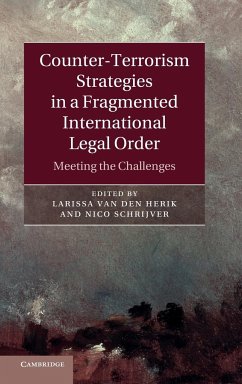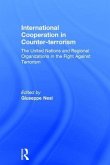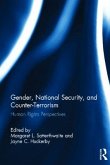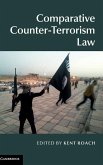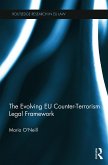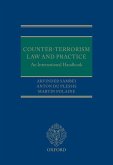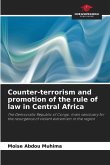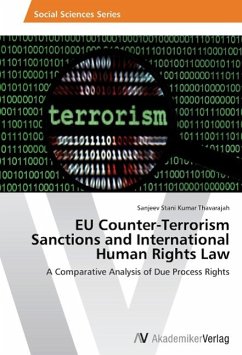Counter-Terrorism Strategies in a Fragmented International Legal Order
Herausgeber: Herik, Larissa van den; Schrijver, Nico
Counter-Terrorism Strategies in a Fragmented International Legal Order
Herausgeber: Herik, Larissa van den; Schrijver, Nico
- Gebundenes Buch
- Merkliste
- Auf die Merkliste
- Bewerten Bewerten
- Teilen
- Produkt teilen
- Produkterinnerung
- Produkterinnerung
An exploration of the relationship between different branches of international law and their applicability to terrorism.
Andere Kunden interessierten sich auch für
![International Cooperation in Counter-terrorism International Cooperation in Counter-terrorism]() International Cooperation in Counter-terrorism206,99 €
International Cooperation in Counter-terrorism206,99 €![Gender, National Security, and Counter-Terrorism Gender, National Security, and Counter-Terrorism]() Gender, National Security, and Counter-Terrorism206,99 €
Gender, National Security, and Counter-Terrorism206,99 €![Comparative Counter-Terrorism Law Comparative Counter-Terrorism Law]() Comparative Counter-Terrorism Law199,99 €
Comparative Counter-Terrorism Law199,99 €![The Evolving EU Counter-terrorism Legal Framework The Evolving EU Counter-terrorism Legal Framework]() Maria O'NeillThe Evolving EU Counter-terrorism Legal Framework80,99 €
Maria O'NeillThe Evolving EU Counter-terrorism Legal Framework80,99 €![Counter-Terrorism Law and Practice Counter-Terrorism Law and Practice]() Martin PolaineCounter-Terrorism Law and Practice456,99 €
Martin PolaineCounter-Terrorism Law and Practice456,99 €![Counter-terrorism and promotion of the rule of law in Central Africa Counter-terrorism and promotion of the rule of law in Central Africa]() Moïse Abdou MuhimaCounter-terrorism and promotion of the rule of law in Central Africa45,99 €
Moïse Abdou MuhimaCounter-terrorism and promotion of the rule of law in Central Africa45,99 €![EU Counter-Terrorism Sanctions and International Human Rights Law EU Counter-Terrorism Sanctions and International Human Rights Law]() Sanjeev Stani Kumar ThavarajahEU Counter-Terrorism Sanctions and International Human Rights Law22,99 €
Sanjeev Stani Kumar ThavarajahEU Counter-Terrorism Sanctions and International Human Rights Law22,99 €-
-
-
An exploration of the relationship between different branches of international law and their applicability to terrorism.
Hinweis: Dieser Artikel kann nur an eine deutsche Lieferadresse ausgeliefert werden.
Hinweis: Dieser Artikel kann nur an eine deutsche Lieferadresse ausgeliefert werden.
Produktdetails
- Produktdetails
- Verlag: Cambridge University Press
- Seitenzahl: 798
- Erscheinungstermin: 1. Oktober 2014
- Englisch
- Abmessung: 235mm x 157mm x 47mm
- Gewicht: 1285g
- ISBN-13: 9781107025387
- ISBN-10: 1107025389
- Artikelnr.: 36772967
- Herstellerkennzeichnung
- Libri GmbH
- Europaallee 1
- 36244 Bad Hersfeld
- gpsr@libri.de
- Verlag: Cambridge University Press
- Seitenzahl: 798
- Erscheinungstermin: 1. Oktober 2014
- Englisch
- Abmessung: 235mm x 157mm x 47mm
- Gewicht: 1285g
- ISBN-13: 9781107025387
- ISBN-10: 1107025389
- Artikelnr.: 36772967
- Herstellerkennzeichnung
- Libri GmbH
- Europaallee 1
- 36244 Bad Hersfeld
- gpsr@libri.de
Introduction: the fragmented international legal response to terrorism;
Part I. Improving International Co-operation in the Investigation and
Prosecution of Terrorist Acts: 1. A snapshot of international criminal
justice co-operation in the fight against terrorism since 9/11; 2.
Terrorist crimes and the Aut Dedere Aut Judicare obligation; 3. The need
for a multilateral co-operative framework for mutual legal assistance; 4.
The role of regional organisations in promoting co-operation on
counter-terrorism matters: the European and African institutions in a
comparative perspective; 5. Lessons of the European Arrest Warrant; 6.
Intelligent co-operation versus evidence collection and dissemination; 7.
International co-operation in counteracting terrorist financing; 8. The
international regulation of the use of force: the politics of
interpretative method; Part II. The Use of Force against Terrorists: 9. The
role of the UN Security Council in relation to the use of force against
terrorists; 10. Self-defence against terrorists: the meaning of armed
attack; 11. Anticipatory self-defence against terrorists; 12. The necessity
and proportionality of anti-terrorist self-defence; Part III. Intersection
between International Human Rights Law and International Humanitarian Law
in the Fight against Terrorism: 13. Armed conflict and terrorist
organisations; 14. Extra-territorial application of the rights to life and
personal liberty, including habeas corpus during situations of armed
conflict; 15. Harmony or conflict? The interplay between human rights law
and international humanitarian law in the fight against terrorism; 16. The
legal regime governing treatment and procedural guarantees for persons
detained in the fight against terrorism; 17. The legal regime governing the
use of lethal force in the fight against terrorism; 18. The legal regime
governing transfer of persons in the fight against terrorism; 19. Terrorism
as a crime in international law and domestic law open issues; 20. All
necessary measures? Reconciling international legal regimes governing peace
and security and the protection of persons in the realm of
counter-terrorism and international law; Appendix: Leiden Policy
Recommendations on Counter-terrorism and International Law.
Part I. Improving International Co-operation in the Investigation and
Prosecution of Terrorist Acts: 1. A snapshot of international criminal
justice co-operation in the fight against terrorism since 9/11; 2.
Terrorist crimes and the Aut Dedere Aut Judicare obligation; 3. The need
for a multilateral co-operative framework for mutual legal assistance; 4.
The role of regional organisations in promoting co-operation on
counter-terrorism matters: the European and African institutions in a
comparative perspective; 5. Lessons of the European Arrest Warrant; 6.
Intelligent co-operation versus evidence collection and dissemination; 7.
International co-operation in counteracting terrorist financing; 8. The
international regulation of the use of force: the politics of
interpretative method; Part II. The Use of Force against Terrorists: 9. The
role of the UN Security Council in relation to the use of force against
terrorists; 10. Self-defence against terrorists: the meaning of armed
attack; 11. Anticipatory self-defence against terrorists; 12. The necessity
and proportionality of anti-terrorist self-defence; Part III. Intersection
between International Human Rights Law and International Humanitarian Law
in the Fight against Terrorism: 13. Armed conflict and terrorist
organisations; 14. Extra-territorial application of the rights to life and
personal liberty, including habeas corpus during situations of armed
conflict; 15. Harmony or conflict? The interplay between human rights law
and international humanitarian law in the fight against terrorism; 16. The
legal regime governing treatment and procedural guarantees for persons
detained in the fight against terrorism; 17. The legal regime governing the
use of lethal force in the fight against terrorism; 18. The legal regime
governing transfer of persons in the fight against terrorism; 19. Terrorism
as a crime in international law and domestic law open issues; 20. All
necessary measures? Reconciling international legal regimes governing peace
and security and the protection of persons in the realm of
counter-terrorism and international law; Appendix: Leiden Policy
Recommendations on Counter-terrorism and International Law.
Introduction: the fragmented international legal response to terrorism;
Part I. Improving International Co-operation in the Investigation and
Prosecution of Terrorist Acts: 1. A snapshot of international criminal
justice co-operation in the fight against terrorism since 9/11; 2.
Terrorist crimes and the Aut Dedere Aut Judicare obligation; 3. The need
for a multilateral co-operative framework for mutual legal assistance; 4.
The role of regional organisations in promoting co-operation on
counter-terrorism matters: the European and African institutions in a
comparative perspective; 5. Lessons of the European Arrest Warrant; 6.
Intelligent co-operation versus evidence collection and dissemination; 7.
International co-operation in counteracting terrorist financing; 8. The
international regulation of the use of force: the politics of
interpretative method; Part II. The Use of Force against Terrorists: 9. The
role of the UN Security Council in relation to the use of force against
terrorists; 10. Self-defence against terrorists: the meaning of armed
attack; 11. Anticipatory self-defence against terrorists; 12. The necessity
and proportionality of anti-terrorist self-defence; Part III. Intersection
between International Human Rights Law and International Humanitarian Law
in the Fight against Terrorism: 13. Armed conflict and terrorist
organisations; 14. Extra-territorial application of the rights to life and
personal liberty, including habeas corpus during situations of armed
conflict; 15. Harmony or conflict? The interplay between human rights law
and international humanitarian law in the fight against terrorism; 16. The
legal regime governing treatment and procedural guarantees for persons
detained in the fight against terrorism; 17. The legal regime governing the
use of lethal force in the fight against terrorism; 18. The legal regime
governing transfer of persons in the fight against terrorism; 19. Terrorism
as a crime in international law and domestic law open issues; 20. All
necessary measures? Reconciling international legal regimes governing peace
and security and the protection of persons in the realm of
counter-terrorism and international law; Appendix: Leiden Policy
Recommendations on Counter-terrorism and International Law.
Part I. Improving International Co-operation in the Investigation and
Prosecution of Terrorist Acts: 1. A snapshot of international criminal
justice co-operation in the fight against terrorism since 9/11; 2.
Terrorist crimes and the Aut Dedere Aut Judicare obligation; 3. The need
for a multilateral co-operative framework for mutual legal assistance; 4.
The role of regional organisations in promoting co-operation on
counter-terrorism matters: the European and African institutions in a
comparative perspective; 5. Lessons of the European Arrest Warrant; 6.
Intelligent co-operation versus evidence collection and dissemination; 7.
International co-operation in counteracting terrorist financing; 8. The
international regulation of the use of force: the politics of
interpretative method; Part II. The Use of Force against Terrorists: 9. The
role of the UN Security Council in relation to the use of force against
terrorists; 10. Self-defence against terrorists: the meaning of armed
attack; 11. Anticipatory self-defence against terrorists; 12. The necessity
and proportionality of anti-terrorist self-defence; Part III. Intersection
between International Human Rights Law and International Humanitarian Law
in the Fight against Terrorism: 13. Armed conflict and terrorist
organisations; 14. Extra-territorial application of the rights to life and
personal liberty, including habeas corpus during situations of armed
conflict; 15. Harmony or conflict? The interplay between human rights law
and international humanitarian law in the fight against terrorism; 16. The
legal regime governing treatment and procedural guarantees for persons
detained in the fight against terrorism; 17. The legal regime governing the
use of lethal force in the fight against terrorism; 18. The legal regime
governing transfer of persons in the fight against terrorism; 19. Terrorism
as a crime in international law and domestic law open issues; 20. All
necessary measures? Reconciling international legal regimes governing peace
and security and the protection of persons in the realm of
counter-terrorism and international law; Appendix: Leiden Policy
Recommendations on Counter-terrorism and International Law.

